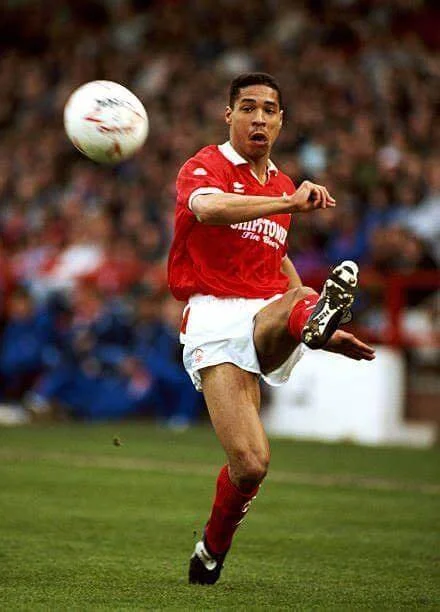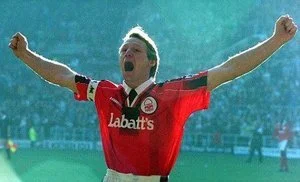Top 5 Greatest Nottingham Forest Players of All-Time
Nottingham Forest’s 5 Best Players Ever
Nottingham Forest is currently one of the “sleeping giants” in world football, having only just been promoted to the Premier League after 23 years away.
However, many will remember the teams of yesterday, which saw Forest bring home the European Cup twice in as many seasons.
Nottingham Forest legend, Des Walker
With a trophy cabinet more decorated than many clubs around the world, you would not be a fool to assume that there was an incredible set of players behind the famous victories.
Throughout the Reds’ 158-year existence, some of the greatest football players to kick a ball have passed through the doors of the City Ground.
Here is a list of the top 5 greatest Nottingham Forest players of all time. We will attempt to wade through hundreds of names and dial it down to just the top 5!
Stuart Pearce (1985 – 1997)
With a left foot like a traction engine, Stuart Pearce was not just known for his no-nonsense defending; he racked up 87 career goals from left-back.
Pearce was afraid of nothing, always stepping up in the important moments when a level, trusted and confident mind was required.
Pearce spent five years in non-league with Wealdstone, before eventually moving on to Coventry City, making over 50 appearances for the Sky Blues.
Brian Clough acquired the defender for what proved to be one of Nottingham Forest’s most successful periods in the club’s history.
In his 12 years at the club, Pearce made 401 appearances, with many of them as captain, scoring 63 goals in that time.
As well as helping Forest to two League Cups and an FA Cup final, Pearce became the club’s most-capped international, making 76 of his 78 total England appearances while at the City Ground.
The now 60-year-old would be given the captain’s armband for England nine times, too, scoring nine goals over 11 years.
Pearce was given the nickname “Psycho” for his unforgiving style of play, putting in consistently crunching tackles and showing the most passion on the pitch.
The full-back would go on to play for Newcastle United, West Ham United and Manchester City, as well as coming out of retirement for a single game for Longford, a team dubbed “the worst in Great Britain”.
Supporting the grassroots game was the priority during this match.
Stuart Pearce: “Psycho”
Des Walker (1984 – 1992 & 2002 – 2005)
During Des Walker’s two spells at the club, the centre-back played in seven cup finals for Forest at Wembley, winning five of them.
He would be awarded the title of Player of the Year on three occasions and he was selected for the PFA Team of the Year in four consecutive seasons.
The 57-year-old made over 300 appearances for Forest, and only scored one goal across his professional career, spanning over 20 years.
Much of the younger generation will regard Manchester City’s Kyle Walker as one of the quickest players to grace a football pitch.
However, the former Walker came way before the Man City man and was deployed at centre-back to take advantage of his outrageous pace and incredibly-timed tackling.
Walker’s defensive mindset led to him being regarded as one of the greatest England centre-backs of all-time.
Despite lacking in height, the centre-back was not afraid of an aerial battle, while his ability on the ground was second-to-none, often frustrating some of the most gifted attackers with incredible man-marking, anticipation and a clean slide tackle.
Walker’s assets were seen by clubs across Europe, with Sampdoria snapping up the Englishman for the 1992/93 season.
He would only manage a single season in Italy, however, before making the move back to England with Sheffield Wednesday, where he spent eight seasons.
Nigel Clough (1984 – 1993 & 1996 – 1997)
Joining Forest as an apprentice in 1982, Nigel Clough jumped ship to Heanor Town for two seasons, before coming back to the City Ground in 1984.
He became a regular on the side for the next few years, ranking among some of the highest scorers in that time.
Not only was Clough an incredible goalscorer, with over a century of goals in over 400 appearances, but the attacker was also fearless on the pitch, facing a clattering from most defenders.
As Clough aged, he moved further back on the pitch, ultimately ending up in midfield, which meant the goals stopped flowing as much and his game needed to change.
Clough was also known to drop back into defence on a handful of occasions, especially in the season that Forest was relegated from the Premier League.
With Stuart Pearce at the helm during the 1996/97 season, Clough played for Forest once again, being loaned out to the club by Manchester City.
He managed to score once in 13 appearances before returning to Manchester.
Although his managerial career is slightly controversial, with a four-year spell at Derby County, Clough is still seen as an incredible figure in Forest’s history, winning the Football League Cup twice and the Full Members’ Cup once.
Peter Shilton (1977 – 1982)
Holding the record for the most competitive appearances in world football, Peter Shilton is one of the best goalkeepers of his generation, and he’s still seen as that in the 21st century.
Nottingham Forest was one of Shilton’s 11 clubs spanning a 30-year career.
The goalkeeper’s first season at the club saw Forest lift the league title, with Shilton making one of the most impressive saves of his career, securing the point they needed during a 0-0 draw with Coventry City.
During the title-winning campaign, Shilton conceded just 18 goals in 37 appearances, leading Forest to glory and winning the PFA Players’ Player of the Year award.
This was just the first of many honours at the City Ground, with Shilton also winning two European Cups, a UEFA Super Cup and the Football League Cup.
As one of the best shot-stoppers in world football, it comes as no surprise to see Shilton’s number of trophies and awards, alongside multiple compilations of his greatest saves.
John Robertson (1970 – 1983 & 1985 - 1986)
John Robertson provided the assist for the 1979 European Cup final’s only goal, as Trevor Francis nodded home from inside the six-yard box.
The following season, Robertson rocketed home the only goal in a 1-0 victory over Hamburg to successfully defend the European Cup.
These two vital goal involvements are enough for any player to become a club legend. However, the winger was so much more than just a goal and an assist.
In his 13-year spell with Forest, alongside a move back to Trentside for a season, Robertson made over 500 appearances for Forest, scoring five goals short of a century.
This coincided with 28 international appearances for Scotland, scoring eight goals between 1978 and 1983.
Despite seemingly looking far from a football player, according to Brian Clough, Robertson possessed the ability and talent to take Forest to new heights.
Even once compared to “the Brazilians” or “the supremely gifted Italians” by Clough, teammate John McGlovern would later say that the winger was “like Ryan Giggs but with two good feet, not one”.
Scoring goals is the easy part as an attacker.
It was the importance of Robertson’s goals that consolidated his status as a club legend, with a First Division title, two League Cups, one FA Charity Shield and a European Super Cup to add to the European Cup double.
In 2016, the 70-year-old was inducted into the National Football Museum Hall of Fame, with his former teammate, John O’Hare, and PFA Chief Executive Gordon Taylor presenting the award.
There was absolutely no doubt about Robertson’s inclusion in this list.
Head over to our football blog for more!


